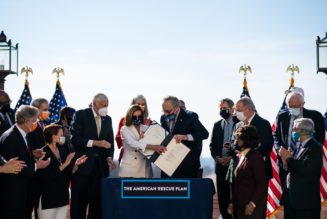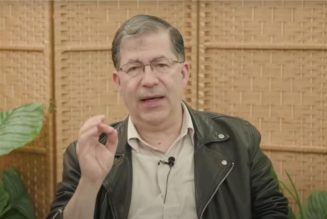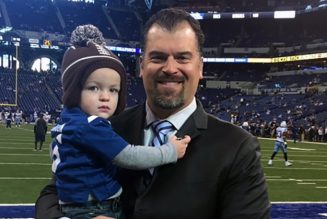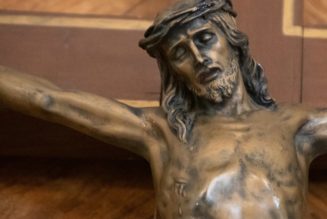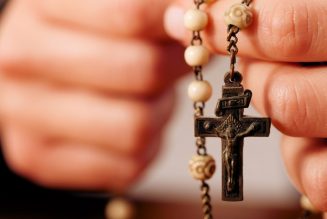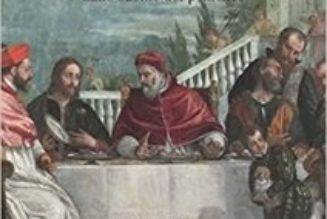, December 17, 2020

On the Fourth Sunday of Advent, Year B, the Gospel has direct application to our lives as we prepare, not just to celebrate Christmas, but to become a dwelling place for the Son of God who wants to make us his adopted sons and daughters.
In the final week of Advent, God asks each of us directly: Will you allow yourself to be remade in the image of Jesus Christ? He wants a thoughtful, honest, affirmative reply.
We can well imagine what Mary and Joseph were doing on the original Fourth Sunday of Advent.
It would take about a week to travel from Nazareth to Bethlehem. So the last week of the original “Advent Season” was a strong push to the end, to find Jesus a place to be born. It was one final week in preparations Mary had started making months earlier, as depicted in this Sunday’s Gospel — and it was the last week of efforts that had started a thousand years earlier, when King David sought to give God a home on earth, in Sunday’s First Reading.
“The angel Gabriel was sent from God to a town called Nazareth, to a virgin betrothed to a man named Joseph, of the house of David, and the Virgin’s name was Mary,” the Gospel begins. “And coming to her, he said, ‘Hail, full of grace! The Lord is with you.’”
Notice that the angel Gabriel gives two reasons it had to be Mary who gave birth to the Christ child. We know one reason: because Mary is “full of grace,” sinless from her immaculate conception to today. But the second reason is because she was “betrothed to a man named Joseph, of the house of David.”
Joseph is key because the Messiah was prophesied to be born of a virgin and to be an heir of David — both of which, thanks to God’s miraculous intervention in the Holy Family, he was.
“I will raise up your heir after you, sprung from your loins, and I will make his kingdom firm,” the Lord tells David in the first reading through the prophet Nathan. And more: “I will be a father to him, and he shall be a son to me,” says God.
Jesus, the son of God, became a true heir of David through Joseph so that we would become true heirs of God through Jesus.
We have a personal stake in what Joseph and Mary are doing, because Christmas is the mystery of the “humble exchange” the priest mentions quietly before the consecration at each Mass. On Christmas Day, the priest will pray it aloud for all to hear: “May we come to share in the divinity of Christ, who humbled himself to share in our humanity.”
This is the startling fulfillment of the prophesy of Nathan. Not only is this a newborn king; it is God himself calling us into his life. What does it mean to “share in the divinity of Christ”? Exactly what it means is spelled out in the Our Father, and we are shown a shortcut to it today in the person of Mary. Compare the two:
Gabriel says to Mary: “Behold, you will conceive in your womb and bear a son … He will be great and will be called Son of the Most High.”
We say to God: “Our Father, who art in heaven, hallowed be thy name.”
Gabriel says to Mary: “He will rule over the house of Jacob forever, and of his kingdom there will be no end.”
We say to God: “They kingdom come.”
Mary says to Gabriel: “Behold, the handmaiden of the Lord. May it be done to me according to your word.”
We say to God: “Thy will be done, on earth as it is in heaven.”
There is even a similarity between how Jesus entered Mary’s life and how he enters ours.
Compare today’s Gospel with what happens at Baptism.
Gabriel tells Mary how this new life will be formed in her: “The Holy Spirit will come upon you, and the power of the most High will overshadow you. Therefore, the child to be born will be called holy, the Son of God.”
At baptism, the priest tells us that the most high will overshadow us, the Holy Spirit will come to us and we will become members of Christ’s body, even receiving a share in the Davidic “anointing” of the Messiah:
“The God of power and Father of our Lord Jesus Christ has freed you from sin, given you a new birth by water and the Holy Spirit, and welcomed you into his holy people. He now anoints you with the chrism of salvation. As Christ was anointed Priest, Prophet, and King, so may you live always as a member of his body, sharing everlasting life.”
In this way, Christmas isn’t just the anniversary of the time Jesus came to spring us from the prison of slavery to Satan; it is when he came to adopt us into his family, to make us sons and daughters of God. “Only when Christ is formed in us will the mystery of Christmas be fulfilled in us,” says the Catechism.
But that doesn’t mean we can rest easy. This only works through humility.
To make sure this high calling doesn’t go to anyone’s head, the Church gives us the first and second readings, from Second Samuel and from Paul’s Letter to the Romans.
In the first reading, David has settled down and wants to build a house for the Lord to dwell in. God points out that it is in fact the other way around — David doesn’t make places for God to live; God makes places for David to live.
David didn’t choose God — “It was I who took you from the pasture,” he says. David didn’t destroy God’s enemies, but rather “I have destroyed all enemies before you,” God says. David doesn’t proclaim God, but “I will make you famous like the great ones of the earth,” says God.
And God will “fix a place for my people Israel,” not the other way around. “I will plant them so that they may dwell in their place without further disturbance.”
This is why the sentimental language of Advent about “preparing a home in your heart for baby Jesus” may be helpful but isn’t the full truth: We are not preparing a place to ease Christ’s way in the world; he is preparing a place to make our lives both harder and more momentous.
Paul gives a kingly proclamation of Jesus Christ as the one who brings “the mystery kept secret for long ages” whose truth is “now manifested … according to the command of the eternal God,” and available to “all nations” through “the obedience of faith.”
This is not an easy thing, and we aren’t doing Jesus any favors. It is a hard thing, and God is giving us a mighty grace, a radical promise, which we only fulfill through obedience.
Tags: Fourth Sunday of Advent Year B, prayer, Sunday Gospel, Sunday Readings
Never miss a post! Subscribe below to our weekly newsletter.
Related
Join Our Telegram Group : Salvation & Prosperity

